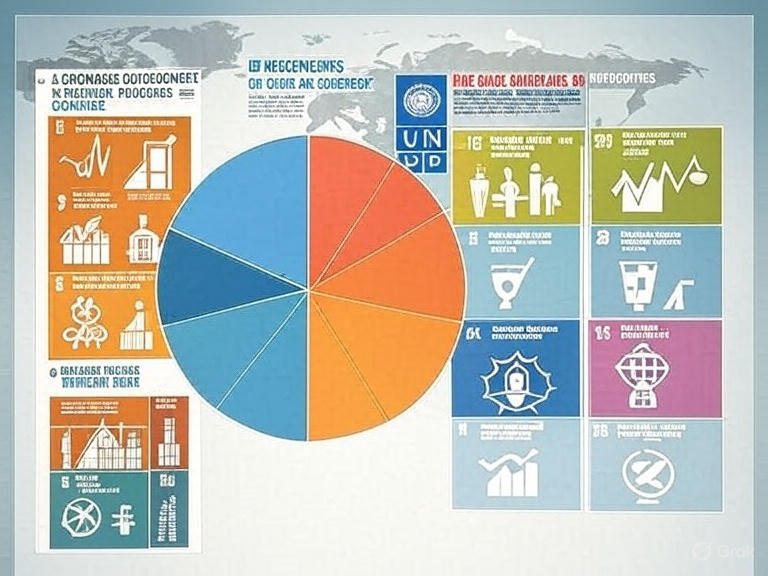By Cheikh Fall – The Third Path Africa

For 60 years, the United Nations Development Programme (UNDP) has been a cornerstone of global development, operating across 170 countries with a $5 billion annual budget and over 23,000 staff. It has achieved notable successes: halving extreme poverty from 1990 to 2015, enabling 800 million people to vote in supported elections, and reducing 5.08 billion tonnes of CO2-equivalent emissions through climate initiatives. Yet, with only 17% of Sustainable Development Goals (SDGs) on track for 2030, UNDP’s impact falls short of its vast potential. As the United States withdraws from key UN agencies, the latest of which is UNESCO, signaling a broader retreat from multilateralism, the pressure mounts for the UN system, including UNDP, to reform. This global shift underscores the urgency to confront UNDP’s inefficiencies and demand transformative changes to keep it leaner, more accountable, and relevant in a rapidly changing world.
UNDP’s sprawling mandate, spanning poverty, climate, governance, and more, dilutes its focus with 169 SDG targets—far more complex than the MDGs’ eight goals. This ambition often leads to vague missions and bureaucratic frameworks that prioritize process over tangible results. The 2025 Seville Conference on Financing for Development, where UNDP played a key role, exemplifies this flaw: despite lofty promises, it failed to secure concrete funding commitments, leaving the SDGs’ $5–7 trillion annual investment gap unaddressed. Such outcomes reflect a deeper issue of bureaucratic inertia and a disconnect from the communities UNDP aims to serve, particularly in developing nations.
The organization’s size is both a strength and a liability. With 30% of its 2023 budget—roughly $1.5 billion—devoured by administrative overhead, including lavish offices in New York, Geneva, and some developing countries, resources are misdirected. Reports and my 26 years of firsthand experience in international development suggest that some Resident Representatives live in upscale residences with support staff, diverting funds from local impact. This extravagance contrasts starkly with local poverty, where 60% of some countries’ populations, like Zambia, live below the poverty line. Moreover, UNDP’s workforce shows inconsistent qualifications, with field staff often unprepared for complex tasks like climate finance. Projects like the Millennium Villages (2005–2015) promised breakthroughs but delivered uneven results, highlighting slow implementation and weak local engagement. Partnerships, such as the SDG Investor Platform, struggle to scale, with global sustainable investments lagging at $18.2 trillion, far short of needs.
The transition from MDGs to SDGs reveals persistent challenges. While MDGs halved extreme poverty and brought water access to 2.6 billion people, progress was uneven, especially in Sub-Saharan Africa. The SDGs risk a similar fate due to funding shortfalls and UNDP’s delays, exacerbated by the COVID-19 pandemic, which pushed 88–115 million back into poverty, exposing the fragility of gains.
To fulfill its promise, UNDP must reform now. Here are four urgent steps:
1. Sharpen the Mission: Narrow UNDP’s focus to high-impact areas—poverty eradication, climate resilience, and governance—aligning with a streamlined SDG set. Simplify frameworks like Integrated National Financing Frameworks to deliver measurable outcomes over bureaucratic red tape.
2. Cut Waste, Boost Expertise: Slash administrative costs by 20%, redirecting funds from headquarters perks to field programs. Invest in rigorous training and hiring to ensure staff are equipped for specialized roles, especially in fragile contexts.
3. Reform Leadership Selection: The UN Secretary-General’s appointment of the UNDP Administrator and the Administrator’s selection of Assistant Administrators must prioritize proven international development expertise over political ties to donor countries. Leaders like Paul G. Hoffman (1966–1972) and nominees like Norway’s Bård Vegar Solhjell, alongside Assistant Administrators like Ulrika Modéer (Sweden, 2018–present), often bring diplomatic rather than development backgrounds. With the Administrator post vacant since Achim Steiner’s exit in June 2025, the UN must enforce transparent, merit-based criteria, requiring extensive field experience to align with UNDP’s goals.
4. Strengthen Accountability and Local Ownership: Establish independent oversight to monitor budget use and project outcomes, including field office budgets to curb excessive perks like upscale residences. As the United States withdraws from key UN agencies, the latest of which is UNESCO, the UN system faces pressure to adopt restrained, effective reforms to silence critics, secure its relevance, and uphold its core missions of peace, justice, development, and friendship between peoples. For UNDP, embedding local voices in program design ensures solutions reflect community needs.
UNDP’s global reach is unmatched, but its potential is undermined by inefficiency and misalignment. The world cannot afford another decade of missed targets. By streamlining its mission, cutting waste, reforming leadership, and embracing accountability, UNDP can evolve from a bloated giant into a nimble force for change. The 2030 deadline is ticking—demand reform from UN leaders and donors via https://undp.org and join grassroots campaigns at thirdpath.africa to ensure SDG accountability.
Readers can explore UNDP’s 2024 Annual Report (https://annualreport.undp.org) for insights and demand action from global leaders to ensure development delivers for the most vulnerable.